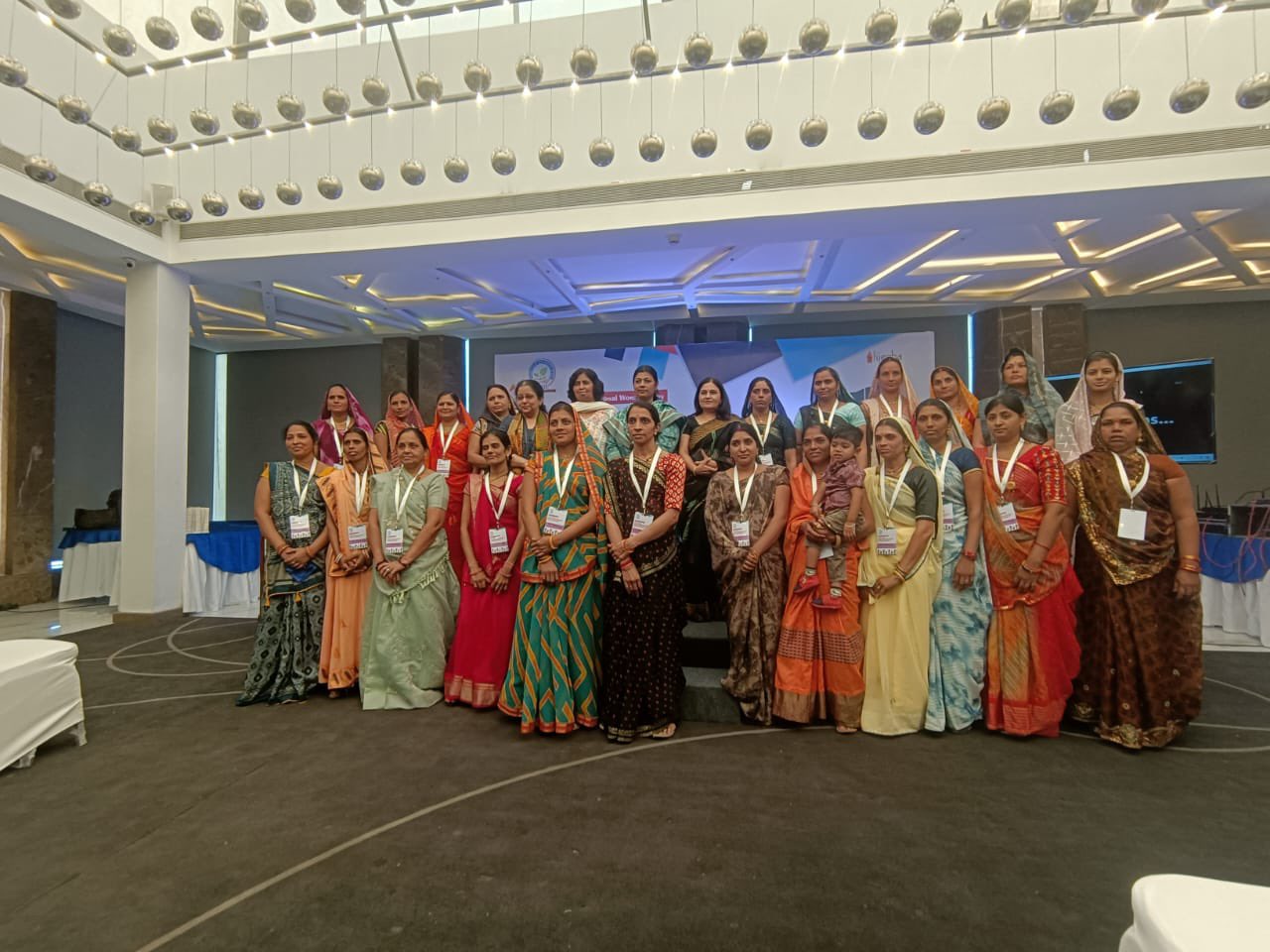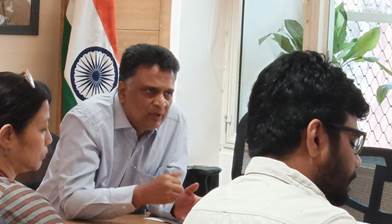Enhance access to inputs, credit and technology to empower women in agriculture: Experts
Author: BI Bureau

Indore: Despite facing challenges such as limited access to inputs, markets, technology, training, and credit, as well as issues related to land ownership and low incomes, women in Indian agriculture have demonstrated remarkable resilience. By advocating for policies that support women's empowerment, improving access to essential resources like technology, and acknowledging women's invaluable contributions, significant progress can be made towards creating a more inclusive and sustainable agricultural sector, experts said on Wednesday.
Noted experts, speaking at a workshop ‘Transforming Agriculture: Women, Technology, and Sustainable Growth’ organised by Federation of Seed Industry of India (FSII) and Forum for Indian Journalists on Education, Environment, Health & Agriculture (Fijeeha), echoed such sentiments ahead of International Women’s Day, here on Wednesday.
Highlighting the role of women in agriculture, Anuja Kadian, Director, FSII, and Government & Industry Affairs Director (Asia Pacific) Corteva Agriscience said, "Despite their significant involvement, rural women are predominantly viewed as labourers rather than recognized as farmers in their own right. There also exists a huge gender income gap which unfortunately is also widening due to the climate stressors.”
“Implementing policies and programs that recognize and formalize the status of women as farmers, ensuring they have equal access to land ownership, credit facilities, and agricultural resources is important. Promoting gender-sensitive agricultural extension services and training programs tailored to women's needs can enhance their agricultural productivity and resilience to climate change,” Kadian added.
Shirley Thomas, Project Director of the Agricultural Technology Management Agency (ATMA), Indore highlighted how the agency was constantly working on enabling women farmers to embrace technologies to make farming easy and more remunerative. Dr Anita Rani, Principal Scientist in Plant Breeding at ICAR-Indian Institute of Soybean Research highlighted the significance of women in agriculture. Dr Monica Jain, Professor & Head of the Department of Life Sciences at Maharaja Ranjit Singh College of Professional Sciences, shared her experience of how it was imperative to empower women on the farm.
Progressive women farmers who brought transformation in their farming practices by adopting precision technologies and better agronomy solutions and inspired their neighbouring women farmers resulting in doubling farm incomes were also felicitated.
Ananda UVL, Director at FSII; Head of Corporate Communications and Media Relations at East-West Seed India; and Director for East-West Seed Knowledge Transfer Foundation, India highlighted how women farmers, including in MP, are increasingly embracing precision agriculture methods, utilizing GPS technology and data analytics for efficiently managing resources like water, fertilizers, and pesticides, resulting in higher crop yields and minimized environmental harm. “With access to timely training and education, rural women can enhance their role in agriculture, fostering both personal growth and contributing to the state's development,” Ananda further said.
There are inspiring stories of women farmers embracing new technologies and techniques to overcome challenges. Precision agriculture methods, such as the use of GPS technology and data analytics, are empowering women to optimize resource usage, increase crop yields, and reduce environmental impact.
Dr Ratna Kumria, Director of AgriBioTech, FSII said, "As part of FSII's commitment to inclusive agriculture, we empower women farmers and workers through policies, technology, and collaborations with our member companies, enhancing their participation in Indian agriculture. Thanks to the Government of India's decisive push, technology is rapidly integrating into agriculture, as seen in the recent use of drones, empowering rural women to supplement their incomes through drone flying.”
Farmers at the event shared their experiences as well.
About FSII
The Federation of Seed Industry of India (FSII) is an association of R&D-based plant science companies dedicated to producing high quality seeds for food, feed, and fiber in India. With a membership carefully curated through screening and invitation processes, FSII stands as a formidable alliance, encompassing both global and domestic seed industry leaders.
Representing 56% of India’s market share and around 70% of the country's seed research and development investments, FSII members are at the forefront of driving innovation.
FSII and its members adopt a collaborative approach, engaging a diverse spectrum of stakeholders, from farmers and regulatory authorities to policymakers and NGOs. This collaborative ethos aims to foster an enabling environment for the growth of India's research-based seed industry. /BI/
More In Public Affairs
NEP-2020 aspires for inclusive excellence in school education
Rajeev Ranjan Roy
The New Education Policy-2020 (NEP-2020), unveiled recently, aims at achieving excellence in school learning by imparting quality, affordable and inclusive education to all, with an extra emphasis on those children coming from socially and educationally disadvantaged groups of the society. It is a futuristic endeavour towards building Ek Bharat, Shrestha Bharat. The previous education policies largely focussed on the issues of access and equity in giving school education, while the NEP-2020 commits to laying the foundation of a vibrant Bharat where no one is devoid of a kind of school education, which helps every student become an asset for the nation in a true sense. The unfinished agenda of the National Policy on Education 1986, which was modified in 1992, has been effectively dealt with in the NEP-2020 along with the vision behind the Right to the Free and Compulsory Education Act, 2009, which “laid down legal underpinnings for achieving universal elementary education.”
Given the undisputed role of education in nation building, the NEP-2020 rightly lays the stress on standardization and accreditation of school infrastructure and teachers as well, since education with accountability, transparency and affordability is the need of the hour, and hence the need to “empower schools, teachers with trust, enabling them to strive for excellence and perform at their very best, while ensuring the integrity of the system through the enforcement of complete transparency and full public disclosure of all finances, procedures and outcomes.” Since private sector is significantly present in the field of school education, the idea to promote ‘not-for-profit’ entities is a unique feature of NEP-2020, which at the same time intends to promote private philanthropic efforts for quality education, thereby affirming the public-good nature of education, while protecting parents and communities from arbitrary increase in tuition fees.
An equally important area, which has got due attention in the NEP-2020 is the need for efficient resourcing and effective governance through school complexes and clusters, a significant initiative in view of the fact that nearly 28 per cent of India’s public primary schools and 14.8 per cent of upper primary schools have less than 30 students. The average number of students per grade in the elementary schooling system – Grades 1 to 8 – is about 14, with a notable proportion having below six students during 2016-17, the year which also had 1,08,017 single-teacher schools, and majority of them – 85,743 – being primary schools taking care of Grades 1-5 children. It was, therefore, a pressing need to evolve a mechanism for establishing a grouping structure, say, school complexes, consisting of one secondary school together with all other schools, which lead to greater resource efficiency and more effective functioning, coordination, leadership, governance, and management of schools in the cluster. This will not only ensure optimum utilisation of resources, but will also foster the sense of oneness and togetherness among the school children, who are the future of the nation.
What further makes the New Education Policy-2020 uniquely special is its pledge for equitable and inclusive education for all, one of the great dreams of our founding fathers. Education, as the NEP-2020 rightly envisions, is “the single greatest tool for achieving social justice and quality.” Inclusive and equitable education, indeed an essential goal in its own right, is also critical to achieving a social order where every citizen has “the opportunity to dream, thrive, and contribute to the nation.” Quality, affordable and ethical education to all is the first move to break multiple social and economic barriers, which sow the seeds of exclusion, discrimination and exploitation against our own people on different parochial considerations.
Needless to say efforts were made in the past as well to bridge the educational chasm between socially and educationally disadvantaged groups (SEDGs) and the children of top social strata, but the desired results remained elusive. SEDGs account for the country’s overwhelming population, but their children’s share in quality school educational institutions has been minimal over the years. Early childhood care and education (ECCE) needs to be handled more comprehensively. According to the Unified-District Information System for Education (U-DISE) 2016-17 data, about 19.6 per cent of students belonged to Scheduled Castes (SCs) at the primary level, but this fraction fell to 17.3 per cent at the higher secondary level. These enrollment drop-outs were more severe for ST students (10.6 per cent to 6.8 per cent), and differently-abled children (1.1 per cent to 0.25 per cent), with even greater declines for female students within each of these categories. Thus, there is no scope for any complacency on the part of the government. A series of interventions including better facilities, more and more hostels, scholarships and other enabling support have been provisioned in the NEP-2020 so that the idea of ‘learning for all’ is realised in a more comprehensive manner.
Teachers are not only an integral part of an education system, but the most important stakeholder in the entire gamut of things. Their quality and ability to teach school students, when they are in their formative age, become something of paramount importance. From their recruitment to training, every precaution needs to be taken to ensure that school education is not rendered to a mere formality, but becomes a game changer. The New Education Policy-2020 comes with a basket full of tools and parameters to ensure holistic training and upgradation of teachers and their teaching skills in a sustainable manner. From continuous professional development (CPD) to career management and progression (CMP), the NEP-2020 vouches for a set of common guidelines – National Professional Standards for Teachers (NPST), which will be put in place by the National Council for Teacher Education (NCTE) in its restructured new form as the Professional Standard Setting Body (PSSB) under the General Education Council. This exercise will be carried out in consultation with National Council Educational Research and Training (NCERT), SCERTs, teachers from across levels and regions.
The teacher education will also undergo a sea-change. By 2030, the minimum degree qualification for teaching will be a 4-year integrated B.Ed. that teaches a range of knowledge content. Today B.Ed. teaching is most poorly regulated in our country ever since the standalone B.Ed. colleges were allowed to be opened up in the private sector. It is high time to take B.Ed. teaching more than seriously. The NEP-2020 stipulates that by 2021, a new and comprehensive National Curriculum Framework for Teacher Education (NCFTE-2021) will be formulated by the NCTE. NCFTE, which will also factor in the requirements of teacher education curricula for vocational education, will be revised once every 5-10 years.
In conclusion, the NEP-2020 visualizes to impart a school education which lays the foundation of a self-reliant India and also to help our country emerge as a knowledge hub. From the foundation of learning to foundational literacy and numeracy to checking drop outs and ensuring universal access to education for all and at all levels to the restructuring of school curriculum, India is in for a metamorphosis in the field of school education, recognizing, identifying and fostering the unique capabilities of each student. Tools such as multi disciplinarity, emphasis on conceptual understanding, creativity and critical thinking, ethics and human and constitutional values, full equity and inclusion, and light but tight regulatory framework are bound to do wonders. Education is a public service, a rare pursuit in nation building, which should be holistic and inclusive and must make one take pride in India and its rich, diverse, ancient and modern culture and knowledge systems and tradition. The NEP-2020 aspires so, indeed!
( The writer is a senior journalist and author. The views expressed are strictly personal.)
NEP-2020 aspires for inclusive excellence in school education
Rajeev Ranjan Roy
The New Education Policy-2020 (NEP-2020), unveiled recently, aims at achieving excellence in school learning by imparting quality, affordable and inclusive education to all, with an extra emphasis on those children coming from socially and educationally disadvantaged groups of the society. It is a futuristic endeavour towards building Ek Bharat, Shrestha Bharat. The previous education policies largely focussed on the issues of access and equity in giving school education, while the NEP-2020 commits to laying the foundation of a vibrant Bharat where no one is devoid of a kind of school education, which helps every student become an asset for the nation in a true sense. The unfinished agenda of the National Policy on Education 1986, which was modified in 1992, has been effectively dealt with in the NEP-2020 along with the vision behind the Right to the Free and Compulsory Education Act, 2009, which “laid down legal underpinnings for achieving universal elementary education.”
Given the undisputed role of education in nation building, the NEP-2020 rightly lays the stress on standardization and accreditation of school infrastructure and teachers as well, since education with accountability, transparency and affordability is the need of the hour, and hence the need to “empower schools, teachers with trust, enabling them to strive for excellence and perform at their very best, while ensuring the integrity of the system through the enforcement of complete transparency and full public disclosure of all finances, procedures and outcomes.” Since private sector is significantly present in the field of school education, the idea to promote ‘not-for-profit’ entities is a unique feature of NEP-2020, which at the same time intends to promote private philanthropic efforts for quality education, thereby affirming the public-good nature of education, while protecting parents and communities from arbitrary increase in tuition fees.
An equally important area, which has got due attention in the NEP-2020 is the need for efficient resourcing and effective governance through school complexes and clusters, a significant initiative in view of the fact that nearly 28 per cent of India’s public primary schools and 14.8 per cent of upper primary schools have less than 30 students. The average number of students per grade in the elementary schooling system – Grades 1 to 8 – is about 14, with a notable proportion having below six students during 2016-17, the year which also had 1,08,017 single-teacher schools, and majority of them – 85,743 – being primary schools taking care of Grades 1-5 children. It was, therefore, a pressing need to evolve a mechanism for establishing a grouping structure, say, school complexes, consisting of one secondary school together with all other schools, which lead to greater resource efficiency and more effective functioning, coordination, leadership, governance, and management of schools in the cluster. This will not only ensure optimum utilisation of resources, but will also foster the sense of oneness and togetherness among the school children, who are the future of the nation.
What further makes the New Education Policy-2020 uniquely special is its pledge for equitable and inclusive education for all, one of the great dreams of our founding fathers. Education, as the NEP-2020 rightly envisions, is “the single greatest tool for achieving social justice and quality.” Inclusive and equitable education, indeed an essential goal in its own right, is also critical to achieving a social order where every citizen has “the opportunity to dream, thrive, and contribute to the nation.” Quality, affordable and ethical education to all is the first move to break multiple social and economic barriers, which sow the seeds of exclusion, discrimination and exploitation against our own people on different parochial considerations.
Needless to say efforts were made in the past as well to bridge the educational chasm between socially and educationally disadvantaged groups (SEDGs) and the children of top social strata, but the desired results remained elusive. SEDGs account for the country’s overwhelming population, but their children’s share in quality school educational institutions has been minimal over the years. Early childhood care and education (ECCE) needs to be handled more comprehensively. According to the Unified-District Information System for Education (U-DISE) 2016-17 data, about 19.6 per cent of students belonged to Scheduled Castes (SCs) at the primary level, but this fraction fell to 17.3 per cent at the higher secondary level. These enrollment drop-outs were more severe for ST students (10.6 per cent to 6.8 per cent), and differently-abled children (1.1 per cent to 0.25 per cent), with even greater declines for female students within each of these categories. Thus, there is no scope for any complacency on the part of the government. A series of interventions including better facilities, more and more hostels, scholarships and other enabling support have been provisioned in the NEP-2020 so that the idea of ‘learning for all’ is realised in a more comprehensive manner.
Teachers are not only an integral part of an education system, but the most important stakeholder in the entire gamut of things. Their quality and ability to teach school students, when they are in their formative age, become something of paramount importance. From their recruitment to training, every precaution needs to be taken to ensure that school education is not rendered to a mere formality, but becomes a game changer. The New Education Policy-2020 comes with a basket full of tools and parameters to ensure holistic training and upgradation of teachers and their teaching skills in a sustainable manner. From continuous professional development (CPD) to career management and progression (CMP), the NEP-2020 vouches for a set of common guidelines – National Professional Standards for Teachers (NPST), which will be put in place by the National Council for Teacher Education (NCTE) in its restructured new form as the Professional Standard Setting Body (PSSB) under the General Education Council. This exercise will be carried out in consultation with National Council Educational Research and Training (NCERT), SCERTs, teachers from across levels and regions.
The teacher education will also undergo a sea-change. By 2030, the minimum degree qualification for teaching will be a 4-year integrated B.Ed. that teaches a range of knowledge content. Today B.Ed. teaching is most poorly regulated in our country ever since the standalone B.Ed. colleges were allowed to be opened up in the private sector. It is high time to take B.Ed. teaching more than seriously. The NEP-2020 stipulates that by 2021, a new and comprehensive National Curriculum Framework for Teacher Education (NCFTE-2021) will be formulated by the NCTE. NCFTE, which will also factor in the requirements of teacher education curricula for vocational education, will be revised once every 5-10 years.
In conclusion, the NEP-2020 visualizes to impart a school education which lays the foundation of a self-reliant India and also to help our country emerge as a knowledge hub. From the foundation of learning to foundational literacy and numeracy to checking drop outs and ensuring universal access to education for all and at all levels to the restructuring of school curriculum, India is in for a metamorphosis in the field of school education, recognizing, identifying and fostering the unique capabilities of each student. Tools such as multi disciplinarity, emphasis on conceptual understanding, creativity and critical thinking, ethics and human and constitutional values, full equity and inclusion, and light but tight regulatory framework are bound to do wonders. Education is a public service, a rare pursuit in nation building, which should be holistic and inclusive and must make one take pride in India and its rich, diverse, ancient and modern culture and knowledge systems and tradition. The NEP-2020 aspires so, indeed!
( The writer is a senior journalist and author. The views expressed are strictly personal.)



